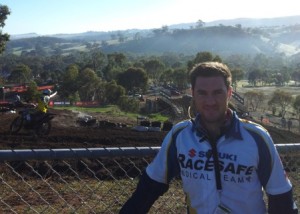Undergraduate perspective on Sports & Exercise Medicine – a BJSM blog series
By Liam West (@Liam_West)
13 flights. 4 countries. One very battered and bruised suitcase. The most incredible 3 months of my life.
 My medical elective enabled me to experience sport and exercise medicine (SEM) outside of the United Kingdom for the first time. A privilege to meet and witness in action many inspirational SEM professionals. I spent eight weeks experiencing front line SEM in three prestigious and internationally renowned centres; the Olympic Park Sports Medicine Centre in Melbourne, Australia, the Stadium Orthopaedic and Sports Medicine Centre in Sydney, Australia and Aspetar – The Qatar Orthopaedic & Sports Medicine Hospital in Doha.
My medical elective enabled me to experience sport and exercise medicine (SEM) outside of the United Kingdom for the first time. A privilege to meet and witness in action many inspirational SEM professionals. I spent eight weeks experiencing front line SEM in three prestigious and internationally renowned centres; the Olympic Park Sports Medicine Centre in Melbourne, Australia, the Stadium Orthopaedic and Sports Medicine Centre in Sydney, Australia and Aspetar – The Qatar Orthopaedic & Sports Medicine Hospital in Doha.
Here are my “top five lessons learnt” for students looking to create a successful career in SEM.
1. Create your own luck
You have to put yourself out there to gain experience. You don’t want to be sitting back in five years time thinking – if only I had asked to join in… For instance, getting involved with sports teams:
- First step – I always read up on the physicians / physiotherapists I have the opportunity to work or come into contact with working with to find out their interests and which sports teams they work for.
- Second step – when it’s appropriate, start a conversation with them about their sports role and how you would love to, if at all possible, attend a training session / match with them to see on-field sports medicine.
- Third step – Repeat first and second steps.
Don’t expect to get paid, but volunteering as a spare pair of hands is always appreciated and can give you invaluable experience. This helped me see the role of the sports physician in Rugby League (Sydney Roosters), Rugby Union (NSW Waratahs and British & Irish Lions), Australian Rules (St. Kilda Saints) and the Trauma Team for the Motor Cross Australia. This leads nicely to the second lesson…
2. Step out of your comfort zone
Most of us have at least one sport that we consider to know pretty well. Challenge yourself to gain experience outside of these sports, the further afield the better. To be a good sports physician you need to be able to deal with any injury that comes into the clinic. By only covering a single sport you will not have the breadth of knowledge to confidently deal with presentations. You might also enjoy it along the way…
3. Broaden your horizons – physiotherapists are awesome sports medicine teachers…
As well as covering a variety of sports, try to gain experience with as many different SEM health professionals as possible. I found that the experiences and conversations I had with physiotherapists, coaches, sports psychologists etc. were invaluable as they provided diverse perspectives. As a sports doctor you need to be aware of all these inputs and opinions to create the optimal management plan for the injured athlete.
4. Network
Possibly the most important lesson – the more people you know, the more opportunities will come your way. Social media is making this more accessible than ever before so if you haven’t thought about things such as twitter to market your interest in SEM, why not start today? My advice would be that you should be yourself when ‘networking’ and prove you are just a normal person with a passionate interest in the field – people employ people they will enjoy working with, not just someone with a good CV. The more homework you have done – reading about sports medicine, attending conferences (by volunteering to work there to save money), building on your existing connections – the more opportunities you will generate.
5. Be confident and enthusiastic
Your lack of specialist expertise can sometimes be of benefit – you may come up with the simple diagnosis that the physician may have ignored whilst for a more complicated one (I am talking from personal experience here!). Having the confidence to question things you don’t understand is very important. Also remember that enthusiasm is infectious – it will make others want to spend that extra five minutes per patient teaching you.
Dr. Liam West BSc (Hons) MBBCh is a graduate of Cardiff Medical School and now works as a junior doctor at the John Radcliffe Hospital, Oxford. He is a founder and current President of USEMS and is also the founder of Cardiff Sports and Exercise Medicine Society (CSEMS). In addition to his role as an associate editor for BJSM he also coordinates the “Undergraduate Perspective on Sports & Exercise Medicine” Blog Series. He has a passion for developing the SEM movement amongst undergraduates and sits on the Council of Sports Medicine for the Royal Society of Medicine as Student Representative and on the Educational Advisory Board for the British Association of Sport and Exercise Medicine. His Twitter handle (as above) is @Liam_West and you can find Liam on Facebook as well.